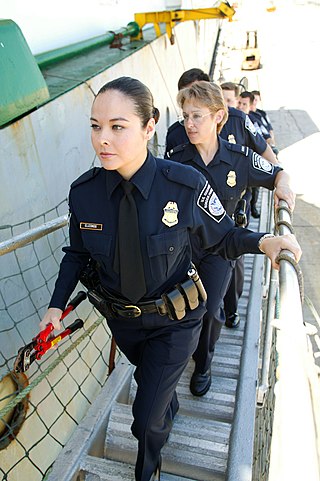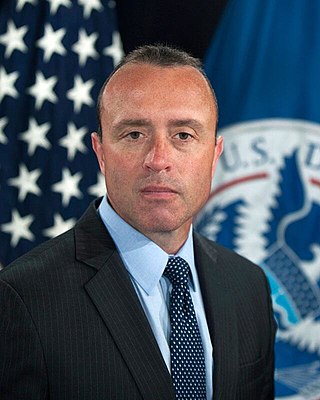Related Research Articles

The United States Department of Homeland Security (DHS) is the U.S. federal executive department responsible for public security, roughly comparable to the interior or home ministries of other countries. Its stated missions involve anti-terrorism, border security, immigration and customs, cyber security, and disaster prevention and management.

The United States Secretary of Homeland Security is the head of the United States Department of Homeland Security, the federal department tasked with ensuring public safety in the United States. The secretary is a member of the Cabinet of the United States. The position was created by the Homeland Security Act following the attacks of September 11, 2001.

The Federal Protective Service (FPS) is a federal law enforcement agency of the United States Department of Homeland Security (DHS). It is also "the federal agency charged with protecting and delivering integrated law enforcement and security services to facilities owned or leased by the General Services Administration (GSA)"—over 9,000 buildings—and their occupants.

The Homeland Security Act (HSA) of 2002, was introduced in the aftermath of the September 11 attacks and subsequent mailings of anthrax spores. The HSA was cosponsored by 118 members of Congress. The act passed the U.S. Senate by a vote of 90–9, with one Senator not voting. It was signed into law by President George W. Bush in November 2002.

The Federal Law Enforcement Training Centers (FLETC) serves as an interagency law enforcement training body for 105 United States government federal law enforcement agencies. The stated mission of FLETC is to "...train those who protect our homeland". Through the Rural Policing Institute (RPI) and the Office of State and Local Training, it provides tuition-free and low-cost training to state, local, campus and tribal law enforcement agencies.
In the United States, fusion centers are designed to promote information sharing at the federal level between agencies such as the Federal Bureau of Investigation, the U.S. Department of Homeland Security, the U.S. Department of Justice, and state, local, and tribal law enforcement. As of February 2018, the U.S. Department of Homeland Security recognized 79 fusion centers. Fusion centers may also be affiliated with an emergency operations center that responds in the event of a disaster.
A Sector is a shore-based operational unit of the United States Coast Guard. Each Sector is responsible for the execution of all Coast Guard missions within its Area of Responsibility (AOR), with operational support from Coast Guard Cutters and Air Stations. Subordinate commands within a Sector typically include Stations and Aids-to-Navigation (ATON) Teams. Some Sector commands also have subordinate units such as Sector Field Offices and Marine Safety Units that are responsible for mission execution in parts of the Sector's AOR. There are 37 sectors within the Coast Guard.
The counter-terrorism page primarily deals with special police or military organizations that carry out arrest or direct combat with terrorists. This page deals with the other aspects of counter-terrorism:

The Office of Intelligence and Analysis (I&A) is the civilian national intelligence component of the United States Department of Homeland Security and one of two statutory members of the United States Intelligence Community (IC) within DHS, the other being Coast Guard Intelligence. It is the only member of the IC tasked with providing intelligence to State, Local, Tribal and Territorial (SLTT) governments, and private sector entities, and developing national intelligence products from information collected by SLTT entities.

The federal government of the United States empowers a wide range of federal law enforcement agencies to maintain law and public order related to matters affecting the country as a whole.

The Under Secretary of Homeland Security for Intelligence and Analysis is a high-level civilian official in the United States Department of Homeland Security. The Under Secretary, as head of the Office of Intelligence and Analysis at DHS, is the principal staff assistant and adviser to the Secretary of Homeland Security and the Deputy Secretary of Homeland Security for fusing law enforcement and intelligence information relating to terrorism and other critical threats.

Caryn Wagner was the Department of Homeland Security’s Under Secretary of Homeland Security for Intelligence and Analysis from February 11, 2010, to December 21, 2012. As such, she was DHS's Chief Intelligence Officer (CINT), in charge of the DHS Office of Intelligence and Analysis with responsibilities over the DHS component intelligence services. She was the first woman to serve in this position, after extensive experience in the U.S. Intelligence Community and on Capitol Hill.

Francis Xavier Taylor was the Under Secretary of Homeland Security for Intelligence and Analysis at the U.S. Department of Homeland Security (DHS), nominated by President Obama in 2014. In that role, he provided the Secretary, DHS senior leadership, the DHS components, and state, local, tribal and private sector partners with homeland security intelligence and information they need to keep the country safe, secure and resilient. DHS Office of Intelligence and Analysis is a member of, and the Department’s liaison to, the U.S. Intelligence Community.

Command Group, "CG", founded as Command Consulting Group, is an international security and intelligence consulting firm, founded in 2009, headquartered in Washington, D.C., United States. CG provides advisory services for governments, corporations, and high net worth individuals.

A Visible Intermodal Prevention and Response team, sometimes Visible Intermodal Protection and Response (VIPR) is a Transportation Security Administration program. Various government sources have differing descriptions of VIPR's exact mission. It is specifically authorized by which says that the program is to "augment the security of any mode of transportation at any location within the United States". Authority for the program is under the Secretary of Homeland Security. The program falls under TSA's Office of Law Enforcement/Federal Air Marshal Service. TSA OLE/FAMS shares responsibility for the program with the Office of Security Operations and Transportation Sector Network Management.

The Department of Homeland Security Appropriations Act, 2014 is an appropriations bill that was introduced into the United States House of Representatives during the 113th United States Congress. The bill would appropriate money to various government agencies related to the United States Department of Homeland Security. This funding would be used during fiscal year 2014, which ends September 30, 2014. The United States House Committee on Appropriations recommended "$38,993,000,000 in discretionary funding for the Department of Homeland Security (DHS) for fiscal year 2014, $34,885,000, or .09 percent, below the amount requested and $613,205,000, or 1.55 percent, below fiscal year 2013 enacted levels."

The WMD Intelligence and Information Sharing Act of 2013 is a bill that would "amend the Homeland Security Act of 2002 to establish weapons of mass destruction intelligence and information sharing functions of the Office of Intelligence and Analysis of the Department of Homeland Security and to require dissemination of information analyzed by the Department to entities with responsibilities relating to homeland security." This intelligence gathering would include not only chemical, biological, radiological, and nuclear threats, but also the analysis of potential threats to public health or U.S. agriculture. The bill passed the United States House of Representatives during the 113th United States Congress and was referred to the United States Senate.

The TSA Office of Inspection Accountability Act of 2014 is a bill that would direct the Inspector General of the Department of Homeland Security (DHS) to review the data and methods that the Transportation Security Administration (TSA) uses to classify personnel as law enforcement officers and to reclassify, as necessary, any staff of the Office of Inspection that are currently misclassified according to the results of that review. The TSA would be required to adhere to existing federal law about what positions are classified as criminal investigators, a fact that determines pay and benefits.
Intelligence sharing is "the ability to exchange intelligence, information, data, or knowledge among Federal, state, local or private-sector entities as appropriate." Intelligence sharing also involves intergovernmental bilateral or multilateral agreements and through international organizations. Intelligence sharing is meant to facilitate the use of actionable intelligence to a broader range of decision-makers.

David J. Glawe was the Under Secretary of Homeland Security for Intelligence and Analysis from January 2017 to May 2020 and is currently the President and CEO of the National Insurance Crime Bureau.